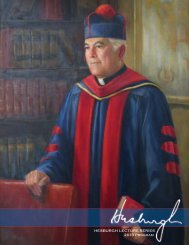HESBURGH LECTURE SERIES 2012 Program - Alumni Association ...
HESBURGH LECTURE SERIES 2012 Program - Alumni Association ...
HESBURGH LECTURE SERIES 2012 Program - Alumni Association ...
You also want an ePaper? Increase the reach of your titles
YUMPU automatically turns print PDFs into web optimized ePapers that Google loves.
Essaka Joshua, Ph.D.<br />
Joseph Morahan Director, College Seminar, College of Arts and<br />
Letters<br />
Biography<br />
Essaka Joshua, B.A. (Oxford), M.A. (Oxford), Ph.D. (Birmingham) is the Joseph Morahan<br />
Director of the College Seminar and a specialist in eighteenth and nineteenth Century British<br />
literature. She is the author of two monographs: Pygmalion and Galatea (2001) and The<br />
Romantics and the May Day Tradition (2007) and is currently working on a book that explores<br />
Categories<br />
physical disability in British literature of the late eighteenth and early nineteenth centuries.<br />
Our culture is saturated with examples of perfect bodies and robust minds, yet progress toward<br />
Social Concerns<br />
recognition of the perspectives of people with disabilities has been slow. Disability studies is<br />
a new discipline that seeks to address this. Like the waves of feminist studies and race studies<br />
before it, disability studies puts the fight for human dignity at the forefront of literary studies. This innovative approach to<br />
understanding disability shows that disability is not a marginal part of our culture, but is central to it. Disability studies aims to<br />
rethink disability history, to reclaim and refute stereotypical images, to question the categories of “normalcy” and “ability,” and<br />
to recognize that disability is not defined by lack. Rereading classical texts such as Frankenstein and Jane Eyre, Joshua asks us to<br />
rethink our ways of seeing disability in literature.<br />
Lectures<br />
“I began to see”: Biblical Models of Disability in Charlotte Brontë’s Jane Eyre<br />
The Bible uses several models of disability; some are negative (e.g., association with sin and punishment), and some are positive<br />
(association with disciplineship and spiritual worth). The allusions to biblical disability in Jane Eyre emphasize the spiritual<br />
gains associated with it. Brontë centers her discussion of biblical disability on the spiritual roles of sight, blindness, and madness<br />
and on the physical body’s relationship to the spiritual body. Reading the novel with attention to biblical references to disability<br />
provides a more progressive understanding of the novel’s account of disability than has hitherto been suggested. If we read in<br />
the light of Brontë’s consistently redemptionist agenda in her selection of biblical allusions, Edward Rochester’s disability is not a<br />
punishment, but is an indication of his spiritual well-being.<br />
Reimagining Disability in Mary Shelley’s Frankenstein<br />
The concept of the voyeuristic viewpoint competes, in eighteenth-century historiography, with a multi-perspectival approach<br />
to history. This lecture places Mary Shelley’s Frankenstein in the context of the historiography of Edward Gibbon and William<br />
Godwin, arguing that the novel changes eighteenth-century historiographical methods that base truth values on visual<br />
perception. Frankenstein underscores, instead, the hierarchical superiority of words over visual evidence, and represents blindness<br />
as a condition that encourages rationality. Shelley characterizes this distrust of sight through extensive use of the “gothic gaze”–an<br />
oppressive, stigmatizing, disciplinary look that is implicated in the definition of normalcy, in social relationships, in moral and<br />
legal culpability, and in narrative authority.<br />
56 The Hesburgh Lecture Series, <strong>2012</strong> <strong>Program</strong>



